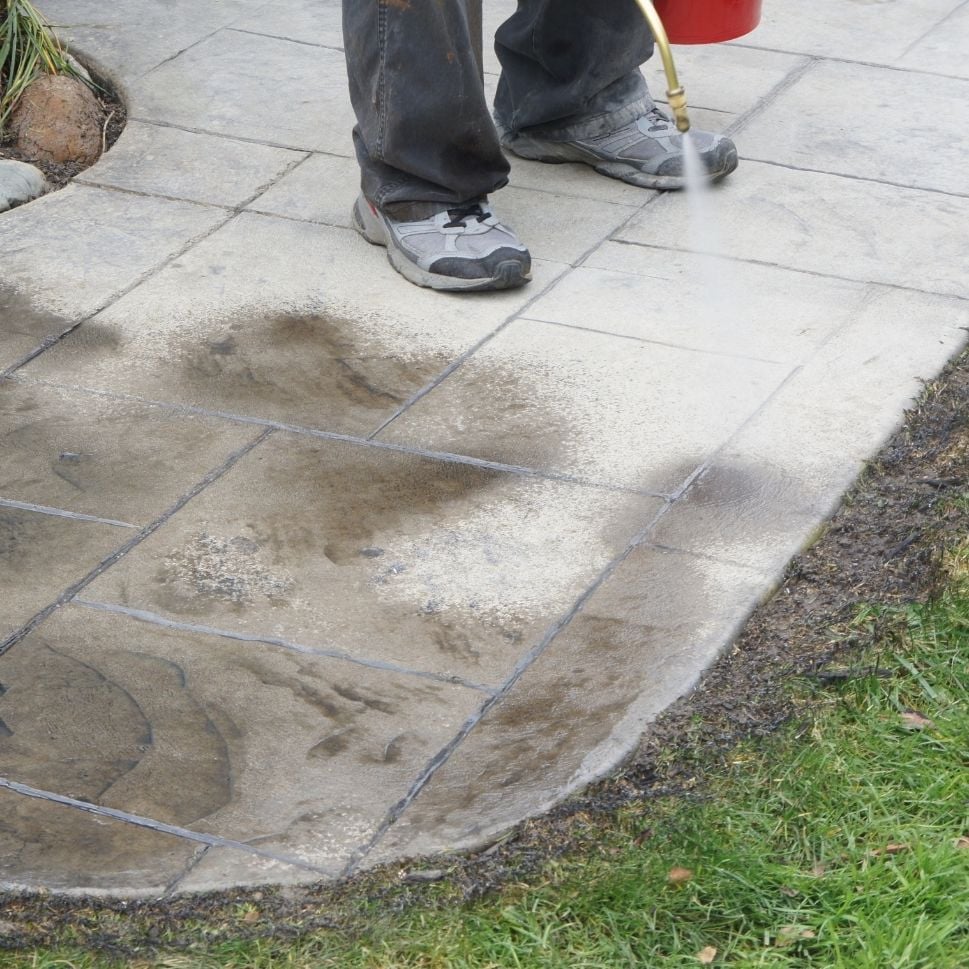Penetrating Concrete Sealer: What Is It and Why Is It Important?
February 24th, 2023 | 3 min. read
By Sarah Etler

Get to know all about what penetrating concrete sealer is and what it can do to protect your concrete surfaces from damage.
Sealing your concrete can seem like a daunting task. With so much room for error when selecting and applying the right sealer, it’s no wonder that so many homeowners feel overwhelmed when it comes to sealing their concrete.
Although it may seem daunting at first, protecting your concrete with a high-quality penetrating sealer is crucial to ensuring that it stays in good shape for as long as possible.
Here at A-1 Concrete Leveling, we’ve been cleaning and sealing concrete for over 30 years, and in this time we’ve seen just how detrimental the consequences of skipping a sealer can be for concrete.
In this article, you’ll find out what penetrating concrete sealer is, why it’s so important, the types of penetrating sealers and their best uses, and some of the most common applications for penetrating concrete sealers.
What Is Penetrating Concrete Sealer?
Penetrating concrete sealer is a product that, when applied to the surface of concrete, absorbs into its pores and undergoes a chemical reaction within the slab that helps prevent water, deicing chemicals, dirt, and other damage-causing agents from breaking down the concrete.
This reaction creates an invisible barrier that protects the concrete but doesn’t change the surface appearance, texture, or tread.
When applied correctly, penetrating sealer can last many years with minimal-to-no maintenance. They are also a non-slippery alternative to most smooth, glossy, or wet-look topical sealers.
Why Is Penetrating Concrete Sealer Important?
Applying penetrating sealer is an important part of maintaining, preserving, and protecting your concrete.
Because a penetrating sealer creates a hydrophobic barrier, applying it to concrete comes with many protective benefits. Rather than absorbing into the concrete’s pores, moisture, salts, stains, and other damaging materials bead on the surface.
A penetrating sealer can also help protect your concrete from UV damage, oils, mold growth, and freeze-thaw cycle damage.
Protection From Freeze-Thaw Cycles
Penetrating concrete sealer is especially important for protecting against freeze-thaw damage. When water gets absorbed into the concrete’s pores and freezes, it expands and causes the pores to pop, which results in surface spalling, cracking, and compounded damage over time as the water thaws and refreezes in the pores.
Because penetrating concrete sealer forms a barrier against water, there is far less opportunity for water to penetrate the surface and cause damage during freeze-thaw cycles.
Types of Penetrating Sealers
There are different types of penetrating concrete sealers on the market that are best suited for different applications, so it’s essential to pick the right one for the job at hand.
Siliconate Penetrating Sealers
Siliconate-based sealers are waterproof and can be absorbed evenly by concrete with different levels of porosity and surface texture. This type of penetrating sealer is a good option for everything ranging from warehouse floors to driveways.
Silane Penetrating Sealers
Silane-based sealers are also waterproof and form a hydrophobic barrier, but they usually require multiple applications to get an effective seal as they penetrate very deep into the concrete. This sealer is best used on denser concrete.
Siloxane Penetrating Sealers
Sixolane-based sealers also create a protective hydrophobic barrier, but they have larger molecules that make it more difficult for the sealer to penetrate into the concrete. In order for this type of sealer to be effective, it must be applied on very porous concrete.
Silicate Penetrating Sealers
Silicate-based penetrating sealers don’t completely protect from water penetration, but they do densify, harden, and strengthen the surface of the concrete. This sealer is best suited for interior applications like warehouse floors, basement floors, or garage floors.
When to Use Penetrating Sealer
Penetrating sealer doesn’t have many negatives, so if you’re using it to preserve and protect your concrete, applying it will help you achieve that goal.
Penetrating sealers can be used on standard concrete, masonry blocks, like pavers and bricks, and aggregate concrete.
Here are some of the most common applications for penetrating concrete sealers:
- Patios
- Pool decks
- Driveways
- Walkways
- Retaining walls
Is Penetrating Sealer Right for You?
Now that you’ve learned what penetrating concrete sealer is and why it’s so important for protecting and preserving your concrete, you’re ready to decide if it’s the right option for you.
If you’re looking for a way to maintain the appearance and performance of your concrete while protecting it from freeze-thaw damage, moisture, deicing salts, and more, applying a penetrating sealer is likely your best bet.
If you’re ready to see what penetrating concrete sealer can do for your concrete, click the link below to request a free onsite estimate with an A-1 expert!
Here at A-1 Concrete Leveling, we want to make sure you have as much information as possible when it comes to making informed decisions about your home and concrete.
For this reason, we’ve created an online library of resources dedicated to answering your questions called Concrete Academy. Check out some of these related topics:
Sarah Etler joined A-1 Concrete Leveling after receiving her Bachelor of Arts degree in English from Northern Kentucky University. As A-1's Content Marketing Manager, she works closely with industry experts to produce content that will best answer questions related to concrete repair and maintenance practices. Sarah loves living a life full of discovery and is excited every day to see what new things she can learn and share with those around her.
Topics: